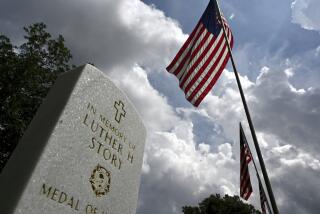Remains of 11 MIAs Returned by North Korea
PANMUNJOM, Korea — North Korea today turned over to American officials wooden coffins holding the remains of 11 U.S. servicemen killed in the 1950-53 Korean War.
The two nations also agreed in principle to form a committee to search for more than 9,000 military personnel still missing, said Sen. Robert C. Smith (R-N.H.), who accompanied the delegation.
The ceremony marked only the second time that North Korea returned American remains since large-scale transfers in 1953 and 1954.
The transfer of remains and the Communist North’s recent promise to allow international inspections of its nuclear facilities reflect the nation’s desire to improve relations with Washington. The United States, closely allied with anti-Communist South Korea, has no formal ties with North Korea.
“We appreciate your efforts to unearth the remains,” Smith said during ceremonies at this border village 30 miles north of Seoul. “This may be a historic occasion and a positive step to improve relations.”
Smith stood with his hand over his heart as North Korean soldiers turned over the coffins to an honor guard of the U.S.-led U.N. Command. A small, blue U.N. flag was placed on each coffin.
Three coffins included metal dogtags bearing the names John R. Bowers, Peter Kubic and David Woodruff. The presence of dogtags did not necessarily mean the remains of the three men would be among those exchanged.
The hometowns for the soldiers were not immediately available.
Small boxes accompanying each set of remains held buttons, leather gloves, boots and an infantryman’s insignia.
“I am grateful,” Smith said. “The American people are grateful, the veterans who fought alongside these men are grateful, and the family members who have faced uncertainty for nearly 40 years are especially grateful.”
Smith, a member of the Senate Armed Services Committee, was accompanied by officials of the State and Defense departments.
North Korea returned the remains of five Americans in May, 1990. It offered to return more remains in September, but procedural problems delayed further transfers.
More to Read
Sign up for Essential California
The most important California stories and recommendations in your inbox every morning.
You may occasionally receive promotional content from the Los Angeles Times.










